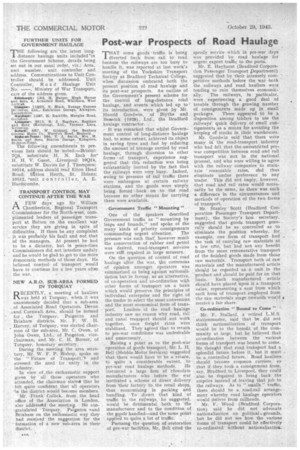Post-war Prospects of Road Haulage
Page 20

If you've noticed an error in this article please click here to report it so we can fix it.
THAT some goods •traffic is being I diverted back from rail to road because the railways are too busy to handle it, was reported at last week's meeting of the Yorkshire Transport Society at Bradford Technical College, when discussion embraced both the present position of road haulage and its post-war prospects. An outline of the Government's present scheme for the control of long-distance ro'ad haulage, and events which led up to' its introduction, were given by Mr. Harold Goodwin, of Blythe and Belwick (1928), Ltd., the Bradford haulage contractor.
It was remarked that whilst Government control of long-distance haulage had, to some extent, achieved its object in saving tyres and fuel by reducing the amount of tonnage carried by road haulage, through diversion to other forms of transport, experience suggested that this reduction was being substantially limited by the fact that the railways were very busy. Indeed, owing to pressure of rail traffic there were embargoes at certain railway stations, and the goods were simply, being forced back on to the road. because no other means for carrying them were available.
Government Traffic " Mounting " One of the speakers described Government traffic as " mounting by leaps and bo_unds," and spoke of the many kinds of priority consignments commanding urgent attention. The pressure was such that however Much the conservation of rubber and petrol was -deiired, road-transport services were stifl required in large measure.
On the question of control of road haulage after the, war, the consensus of opinion amongst operators was summarized as being against nationali'Zation but in favour, as an alternative, of co-operation and co-ordination with other forms of transport on a basis which would preserve the principles of individual enterprise and the right of the trader to select the most convenient and the most economical form of trans
port. Leaders -of the road haulage industry saw no reason why road, rail and canal transport should not work together, once freight fates were stabilized. They agreed that to return to pre-war conditions' was undesirable and unnecessary.
Raising a point as to the post-war operation of goods transport, Mr. L. H. Bell (Hebble Motor Services) suggested that there would have to he a return, to quite a considerable extent, to pre-war road haulage methods. He instanced a large firm of 'chocolate manufacturers who before the 1. ar instituted a scheme of direct delivery from "their factory to the retail sho thus economizing in packing and handling. To divert that kind of traffic to the railways, he suggested, would be detrimental both to the manufacturer and to the condition of the Rods handled—and the same point applied to quite a lot of traffic.
Pursuing the question of restoration of pre-war facilities, Mr. Bell cited the speedy service which in pre-war days was provided by road haulage for urgent export traffic to the ports.
Mr. E. Hayhurst (Bradford Corporation Passenger Transport pepartmen t) suggested 'that by their intensely competitive methods before the war both the railways and road hauliers were tending to ruin themselves economically. The railways, in .particular, were experiencing a good deal of trouble through the growing number of consignments made up in small packages. There appeared to be a disposition among traders to use the railways' quick delivery of small consignments as a means for avoiding the keeping of stocks in their warehouses.
Mr. Goodwin said that there we're many in the road-transport industry who had felt that the,unrestricted pre-. war competition between road and rail transport was not in the national ipterest, and who were willing to agree with the railway companies to maintain ' reasonable rates, aid thus eliminate undue preference to any trader. This did not imply, however, that road and rail rates would necessarily be the same, as there was such a difference' in the circumstances and methods of operation of the two forms of transport.
Mr. Stanley Scott (Bradford Corporation Passenger Transport Department), the Society's hon secretary, suggested that .goods transport generally should be so controlled as to eliminate the position whereby, for, example, one form of transport had the task of carrying raw materials at a low rate, but had not any benefit from the more remunerative transport of the finished goods made from. those raw materials. Transport both of raw materials and the manufactured article shonld be regarded as a unit in the product and should be paid for on that basis. Each manufactured article should have placed upon it a transport value, representing a sum from which each form of transport employed from the raw materials stage onwards would receive a fair share.
Co-ordination" Bound to Come'
Mr. F. Stallard, a retired L.M.S. stationmaster, said that he did not think nationalization of transport would be to the benefit of the cornMunity at large, but he believed that co-ordination between the various forms of tranSport was bound to come. He thought that road transport had a splendid future before it, but it must be a controlled future. Road hauliers should b€come common carriers, so that if they took a consignment from say, Bradford to Liverpool, they could also be fequired to bring back the empties instead a leaving that job to the railways. As to " smalls " traffic, there should be a road-rail arrangement whereby road haulage operators would deliver from railheads.
Mr. F. Wood (Bradford Corporation) said he did not advocate nationalization on political. grounds, but he did not see how the various forms of transport could be effectively co-ordinated without nationalization.




















































